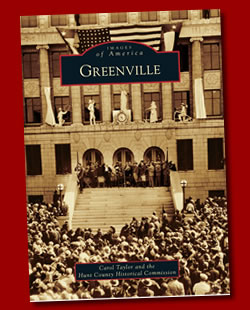
|
 |
|---|

Announcing Carol's latest book:
Images of America - Greenville
Click on book to learn more.
Books by Carol C. Taylor
Images of American: Greenville
From the book's back cover: Located in the rolling Blackland Prairies of Northeast Texas, Greenville was founded in January 1847 as the county seat of Hunt County. Through the years, it became not only the seat of local and county government, but the economic, social, and cultural center of much of the area. With the arrival of the railroads in 1880, Greenville became a market center for cotton, livestock, and other agricultural products, and a vast assortment of goods were available to discerning shoppers. Paved roads, a professional theater, baseball, football and the North Texas Fair brought visitors to Greenville from the surrounding areas. Merchants, bankers and entrepreneurs worked diligently to create a community of modern conveniences, beautiful homes, churches, and schools. One of the first municipally owned power plants opened in Greenville in the late 19th century. Though they do keep up with the times, Greenville residents continue to honor their town's remarkable history.
The Images of America series celebrates the history of neighborhoods, towns and cities across the country. Using archival photographs, each presents the distinctive stories from the past that shape the character of the community today.
The Devil's Triangle: Ben Bickerstaff, Northeast Texans, and the War of Reconstruction in Texas
co-authored with James M. Smallwood and Kenneth W. HowellReview by Bob Bowman, September 17, 2007 Column.
Published with permission
A weekly column syndicated in 70 East Texas newspapers
In Texas, as in the rest of the Confederacy, the Reconstruction Era between 1865 and 1877 saw little more than a continuation of the Civil War in a new guise. The Union won the first phase of the war that pitted professional armies against each other between 1861 and 1865, but the South won the second phase that developed into guerrilla warfare.In Texas, terrorist groups, such as the Ku Klux Klan, operated in at least seventy-seven counties, including much of East Texas. The number of men belonging to such groups were legion.
Returning Confederate veterans organized outlaw gangs that functioned much like the terrorist groups, their goal being to continue the war and to take the battle to Yankee occupiers, native white Unionists, and their allies, the slaves freed by Abraham Lincoln’s Emancipation Proclamation.
In Texas, the Democratic Party, the party of secession and war, used the terrorist groups to retake power and defeat the process of Reconstruction.
“The Devil’s Triangle,” by James M. Smallwood, Kenneth W. Howell and Carol C. Taylor, provides a fascinating look at this turbulent era.
240 Pages
Cloth CoverOrder book through the East Texas Historical Association.
| Home | Services | About Carol | Lectures & Classes | Articles | Blog | Contact Carol |
|---|
